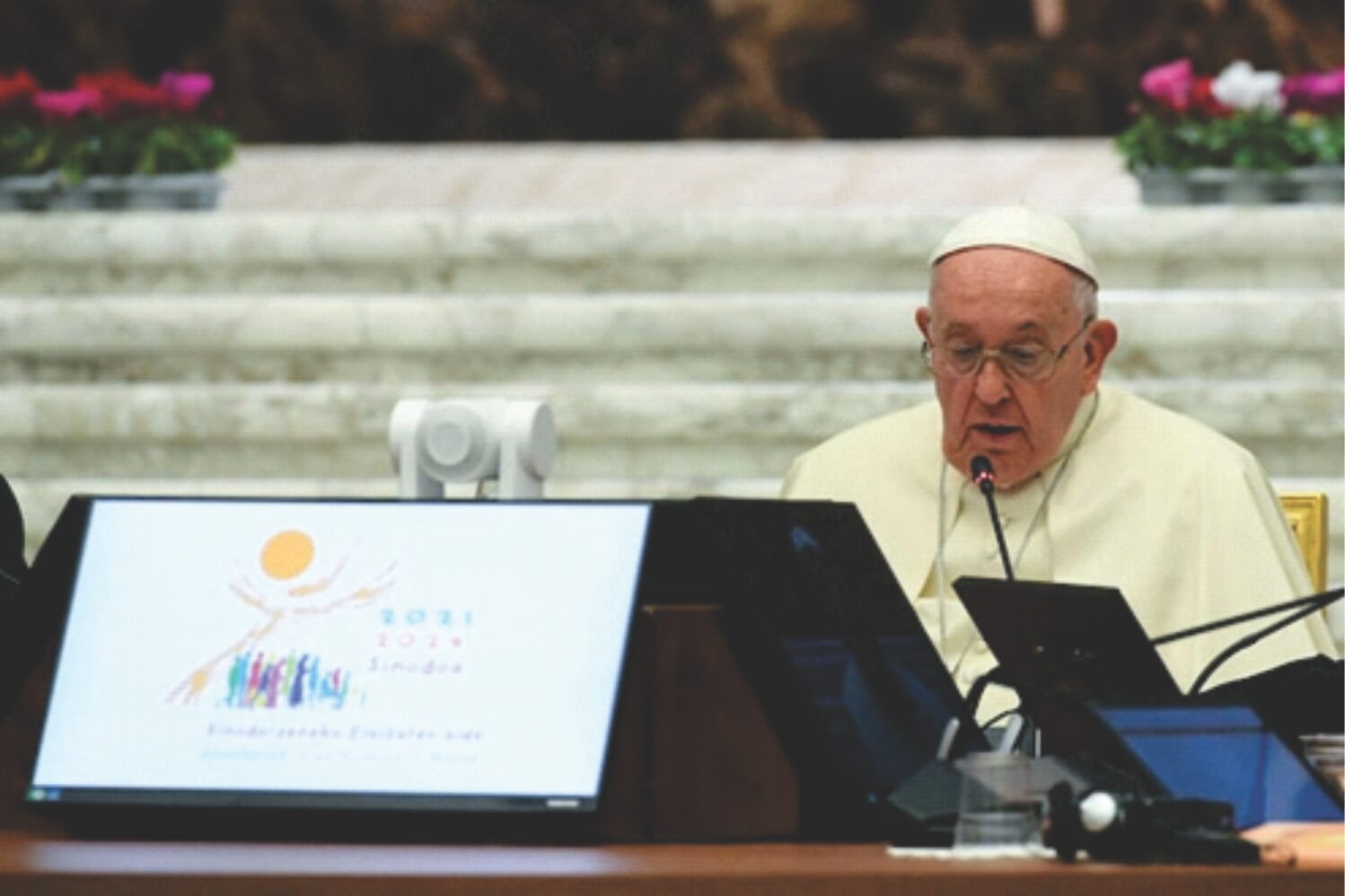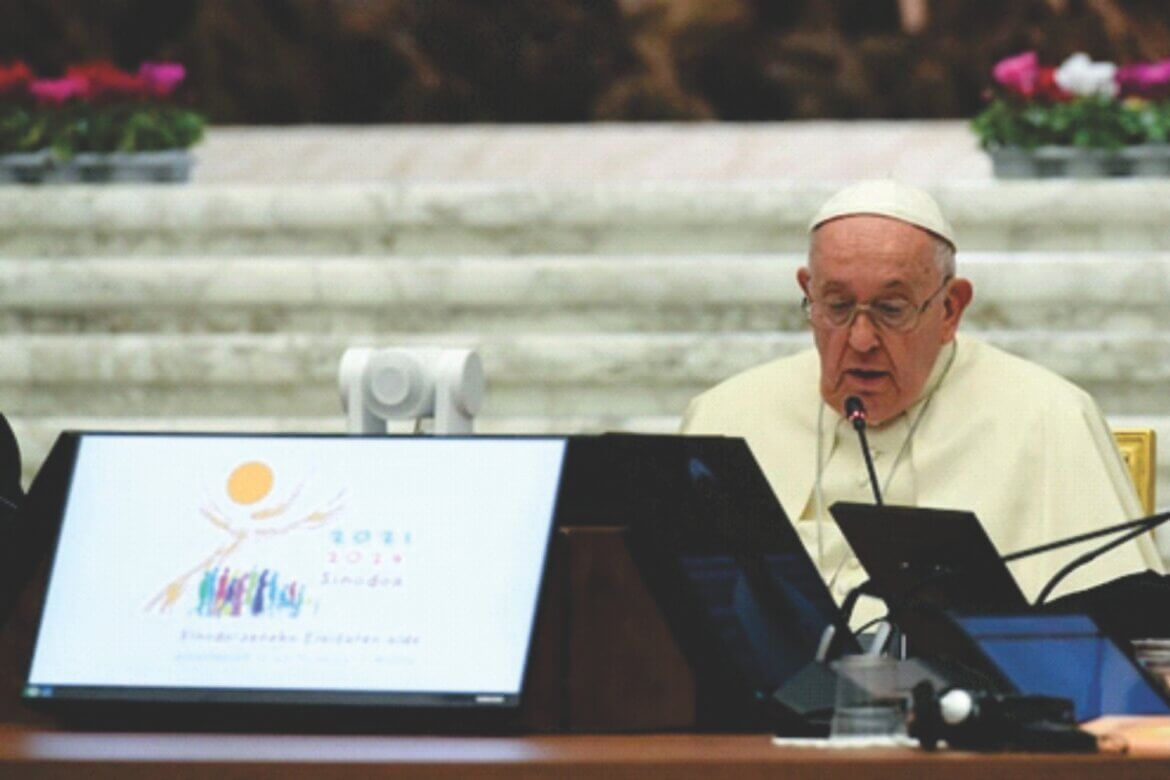Synod and Environment Seen as Key to Francis Era
Eric Reguly, European Bureau Chief, Vatican City
Volume 38 Issue 10, 11, & 12 | Posted: December 27, 2023

Five years ago, Kate McElwee, the young American woman who is the executive director of the Women’s Ordination Conference, led a small protest at the Vatican to call attention to the plight of the hard-working – yet utterly powerless – women in the paternalistic Catholic Church. “I was held by the police,” she said. “We were being called the Vatican suffragettes.”
Back then, it was hard to believe that women would ever be ordained deacons – the final rank before admission to the priesthood – let alone priests. Today, that notion is no longer unthinkable. The ordination of women and women’s empowerment in general within the Catholic Church has emerged as a central theme of Pope Francis’s latest synod, which began in Rome on Wednesday and marks his first in four years.
Officially called the Synod on Synodality, the three-week assembly of bishops and laypersons could unfold as one of the key events in Francis’s decade-long papacy. Even before the synod was officially launched, it created waves, as the church’s conservative and progressive arms prepared for a tug of war over issues ranging from the ordination of women and same-sex marriage to clerical celibacy and the status and rights of LGBTQ+ Catholics.
The synod will also launch a new letter on the environment, as radical climate change threatens to wreck what Francis calls “our garden home.”
Some Vatican observers and journalists who cover one of the world’s oldest institutions have said the synod could be a “watershed moment” for both the church and Francis, the 86-year-old Argentine pontiff who has been in poor health this year, though seems to have rallied in recent months.
Pope Francis cements legacy, stamps Church future with new cardinals
Already, the gathering has made history. For the first time, a pope is allowing women and laypersons to vote along with bishops. The synod has 465 participants, of which 365 are voting members. Among the voters are 54 women, and their participation is seen as evidence that Francis wants a more inclusive church, though it remains unclear how far he is willing to go.
In Ms. McElwee’s opinion, the ordination of women is moving ever closer, even if a vote on recommending the creation of women deacons could be bumped into this time next year, when the second half of the synod is to take place. “I feel that we are at a tipping point,” she said in an interview with The Globe and Mail in Rome. “For us, having ordinated women is a matter of justice.”
There is a precedent for it. Women were deacons in the early church, but the diaconate, as the office is called, was abolished in the Middle Ages, then restored for men only as a “ministry of service” during the Second Vatican Council in the early 1960s, when Pope John XXIII felt the church needed “updating.” But John failed to give women any significant powers, even though many were highly trained for work in the Vatican and the broader church hierarchy. “It was like sending men and women to medical school and, at the end, insisting that only the men could become doctors,” Ms. McElwee said.
Pope Francis insists Europe doesn’t have a migrant emergency and challenges countries to open ports
Many Catholic women’s groups, and high-profile women, are putting pressure on the synod voters to make a breakthrough. Several dozen pro-reform organizations have launched an alternative synod, whose speakers include British lawyer Cherie Blair and former Irish president Mary McAleese.
There is little evidence that Francis is opening the door to women priests, who can celebrate mass, hear confessions and become bishops. But bishops in a previous synod, in 2019, gave their support to the idea of women deacons, as well as allowing some married men to become priests. Francis launched two commissions to study the ordination of women, in 2016 and 2019, but ordination advocates dismissed them as opaque and inconclusive exercises.
Ms. McElwee and other women’s rights advocates take heart in the fact that Francis has included women voters in the synod and that some powerful figures in the Vatican, who presumably have the ear of the Pope, have advocated for gender equality. They include Cardinal Mario Grech of Malta and France’s Sister Nathalie Becquart, who, as undersecretary of the General Secretariat of the Synod of Bishops, is the Vatican’s highest-ranking woman.
The Pope has also softened his stand on other issues that were considered taboo among previous pontiffs.
On Monday, the Vatican released a statement by Francis that said priests may use their discretion in blessing same-sex marriages as long as they fall short of stating, or even implying, that the union is equivalent to heterosexual marriage. This after some dioceses in Germany and elsewhere in Northern Europe held ceremonies to bless same-sex couples in defiance of the Vatican’s official ban on condoning such unions.
The church defines marriage exclusively as the union of a woman and a man. But Francis said that priests, acting out of pastoral charity, should have some freedom to determine “whether there are forms of blessing, requested by one or more people, that do not convey a misconception of marriage.” The statement is in keeping with his theme that the church should be far more inclusive and that love, as he once wrote, “makes us strive towards universal communion.”
Francis’s stand on same-sex blessings has riled some conservative factions in the church. Cardinals Raymond Burke of the United States, a canon lawyer who is seen as the voice of traditionalism, and Guinean Cardinal Robert Sarah, who has denounced “Western homosexual and abortion theologies,” were among the cardinals who have questioned the authority of the synod. They wanted to know whether the blessing of same-sex unions can be consistent with church teachings, which say that “homosexual acts are intrinsically disordered.”
Francis’s synod will have an environmental element as well. The Vatican recently revealed that the Pope has written a second part to his landmark 2015 environmental encyclical, Laudato si‘ – Praise be to you, with its themes of human ecology, caring for the environment and addressing climate change.
On Wednesday evening, Canadian Cardinal Michael Czerny, prefect of the Dicastery for Promoting Integral Human Development, and Justin Welby, the Anglican Archbishop of Canterbury, among others, were to appear on a panel to be broadcast on YouTube to discuss Laudate Deum (Praise God), as the second part of Laudato si’ is known. Above all, it appears to be a plea for action on the climate emergency.
In it, Francis writes: “With the passage of time, I have realized that our responses have not been adequate, while the world in which we live is collapsing and may be nearing the breaking point … the effects of climate change are borne by the most vulnerable people, whether at home or around the world.”
(See related article in the ‘Features’ tab entitled “Hidden Gems in the Synod Report”)
Eric Reguly, European Bureau Chief, Vatican City

